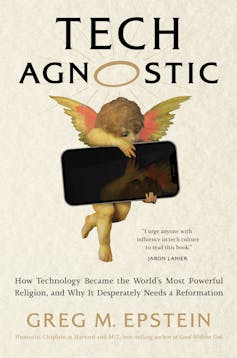In September 2015, the controversial engineer, entrepreneur and Silicon Valley mogul Anthony Levandowski set out to establish a new religion. He called it the Way of the Future – or WOTF.
According to documents filed at the time with the State of California, the objective of WOTF was to “develop and promote the realization of a Divinity based on Artificial Intelligence”.
Levandowski’s idea was that, even if he wasn’t born yet, we should all start worshiping a technological god in advance. Because, on the inevitable day of his arrival, this might be the only way to avoid his horrible wrath.
Review: Tech Agnostic: How Technology Became the World’s Most Powerful Religion and Why It Desperately Needs Reform – Greg M. Epstein (MIT Press)
Nearly a decade later, technology has yet to achieve god-like status, vengeful or benevolent. But the use of religious language to describe technology has become widespread.
Those who work on AI tell us, for example, that its powers will soon become “magic“. Modern-day prophets like Ray Kurtzweil and his many disciples insist that we are on the brink of a “singularity“, in which technology will allow us to overcome all previous limitations of human existence, including death.
Numbers like Sam Altmanthe CEO of OpenAI, can be heard say things like “I don’t pray for God to be on my side, I pray to be on God’s side,” and “working on these models really is like being on the side of the angels.”
Even billionaire media mogul Oprah Winfrey assured us, in a recent television special, that contemporary smart technology is nothing less than “miraculous“.
The religion of technology
This excess of religious rhetoric could be attributed to the ostentatious hyperbole that characterizes Silicon Valley capitalism. Indeed, draping products with the patina of divinity is not a new marketing strategy.
But according to Greg Epstein, a secular ethicist and former humanist chaplain at Harvard and MIT, we find ourselves talking about modern technology in religious terms because modern technology (or what he calls “technology”) has effectively become a religion. And “not just a religion”. Epstein says technology is “the dominant religion of our time.”
No other force on the planet commands so much praise. No other power requires so much dedication. Nothing else has such a firm grip on the rituals and practices of our daily lives.

At first glance, the idea that technology has become a new religion seems to have some explanatory power. It’s not just that things like smartphones, algorithms, apps, and social media are an integral part of our economic world. Nor is it simply that they have infiltrated every aspect of ordinary experience, to the point where it would be almost impossible to function without them.
The fact is that the cultures that have developed around these tools have come to dominate how we understand ourselves, our collective existence, and even our place in the universe.
As Epstein says, “technology offers contemporary Western lives, so polarized and divided in countless ways, a common principle, a common story by which we tell each other who we are.” Furthermore, technology broadcasts “moral and ethical messages, not as mere secondary elements, but as an integral part of its overall value proposition(s).
So, companies like Google or Alphabet and individuals like Jeff Bezos or Mark Zuckerberg are not content with accumulating staggering wealth. They take it upon themselves to issue orders such as “don’t be mean,” “do the right thing,” and “make history.” They enthusiastically proclaim the good news of a “connected future” that will “give everyone a voice” and “transform society.”
Accordingly, Epstein reasons:
Technology is not an ordinary “industry,” where profit and loss statements, products sold, or efficiencies gained can tell its story. The story of the commercial success of technology (…) is the story of how human beings perceive themselves in the world. It is a story where we feel that our existence has meaning, that our daily life has a purpose.
Elites and extras
Amidst a considerable amount of detail, Epstein’s analysis of this new religion has two fundamental elements.
On the one hand, it suggests that, in its current form, technological religion serves to divide humanity between a small number of the chosen and a large majority of the damned. This foreshadows that the chosen souls will soon be uploaded to a paradise of disembodied immortality, while the rest will become slaves to machines or condemned to oblivion.
On the other hand, as his title suggests, Epstein is a technology agnostic – not a technology atheist. His call is for the “reform” of technological religion, not its abolition. He thus recommends that we place our faith in a multitude of what he calls “apostates and heretics”: those who develop critiques of technological religion and propose credible alternatives.
On this side of the ledger, Epstein places proponents of “responsible” and “ethical” technology. He hopes that a group of such figures, loosely affiliated, will manage to form a “congregation” that will confront the established order, take charge of the technological narrative, and steer it in the direction of human justice and equality.

Robin Wolfson Agency.
Epstein’s view of technology as religion has heuristic value, but at some point it becomes a bit forced. He begins to grasp any connection he can possibly make between the two domains. Its central argument is lost. Instead, we have a series of possible affinities, some more credible than others.
Moreover, despite Epstein’s repeated efforts to suggest otherwise, it is not at all true to say that contemporary Silicon Valley capitalism is the first form of capitalism to be characterized as an ethical or spiritual enterprise rather than as a crudely commercial enterprise.
From the sweet trade 18th century arguments to the founding fathers of neoliberalismcapitalism has always presented itself as an essentially moral project intended to transform unruly human passions into rational human interests. What is the famous “?”invisible hand» of the market if not a secularized version of Providence?
One of the most striking features of Tech Agnostic, much of which consists of interviews with industry and academic elites, is Epstein’s incredible access to these numbers – something no doubt made possible by his association with elite institutions like Harvard and MIT.
Yet, about halfway through the book, Epstein stumbles upon the following formulation: “For every highly educated tech or Western executive enjoying the benefits of AI and social media connections, how many moderators are there content traumatized in Manila (…) lithium miners in Congo? (…) Chinese factory workers?
Technology, he later proposes, “needs fewer in-depth, precise narratives and much more in-depth character studies of the actors it currently treats as extras.” Can those who reap the benefits of technology’s many successes take the time to better understand the reality of those who suffer here and now?
These are excellent questions that Epstein, for all his insight, could have asked himself very effectively.


